As machines become more and more efficient and perfect, so it will become clear that imperfection is the greatness of man.—Ernst Fischer
Elizabeth Gurley Flynn (1890-1964)
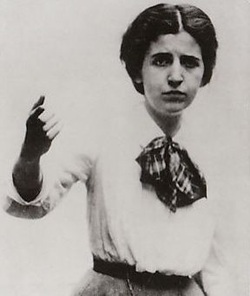
Elizabeth Gurley Flynn
What is a labour victory? I maintain
that it is a twofold thing. Workers must gain economic advantage, but they must
also gain revolutionary spirit, in order to achieve a complete victory. For
workers to gain a few cents more a day, a few minutes less a day, and go back
to work with the same psychology, the same attitude toward society is to
achieve a temporary gain and not a lasting victory.—Elizabeth
Gurley Flynn
There is less violence against labor today, but there are more legal restrictions... There has been labor protection by law but there has also been labor repression by law.—Elizabeth Gurley Flynn, 1962
I'm in the labor movement and I speak my own piece. —Elizabeth Gurley Flynn, 1906, as a 16 year-old radical
What precipitated the big strike in 1912, which is one of the great historical struggles in our country, was a political act on the part of the State. The hours of labor were reduced to 54 hours. You can imagine what they were before. That was only for women and children, but it affected something like 75% of the workers in the mills. On the first pay after the law went into effect, the employers cut the wages proportionately to the cut in-hours and the wages were on the average of $7 and $8 a week at that time, and the highest pay to loom fixers and more highly skilled were getting possibly, $15 and $20. It was a margin between mere subsistence and starvation and so there was a spontaneous strike.—Elizabeth Gurley Flynn, 1962, on the Bread and Roses Strike
They did not believe in making any contracts. They believed that as long as you were organized, you could hold the office to what it said it was going to do. But a contract, a piece of paper held you and so they didn't make any contracts.—Elizabeth Gurley Flynn, 1962, on the philosophy of the IWW
We couldn't see things with the eyes of 1962. We saw them with the eyes of 1905 through about 1917. Well, we certainly never heard of such a thing and we never thought it would be possible, that there would be social security or unemployment insurance... Also, we never heard of vacations with pay. We never heard of vacations, let alone vacations with pay. We never heard of seniority as it is understood today. There were no pensions for retirement of workers.—Elizabeth Gurley Flynn, 1962
History has a long-range perspective. It ultimately passes stern judgment on tyrants and vindicates those who fought, suffered, were imprisoned, and died for human freedom, against political oppression and economic slavery.—Elizabeth Gurley Flynn
Why did good hard-working people suffer so? Why were men who were willing, able, and anxious to work, denied jobs? Why was there so much unemployment? Why were there rich people who apparently did little but enjoyed life?—Elizabeth Gurley Flynn, 1952
I hated poverty. I was determined to do something about the bad conditions under which our family and all around us suffered. I have stuck to that purpose for 46 years. I consider in so doing I have been a good American. I have spent my life among the American workers all over this country, slept in their homes, eaten at their tables. They are the majority of the people who have the inalienable right in our view to govern the country.—Elizabeth Gurley Flynn, 1952
There is less violence against labor today, but there are more legal restrictions... There has been labor protection by law but there has also been labor repression by law.—Elizabeth Gurley Flynn, 1962
I'm in the labor movement and I speak my own piece. —Elizabeth Gurley Flynn, 1906, as a 16 year-old radical
What precipitated the big strike in 1912, which is one of the great historical struggles in our country, was a political act on the part of the State. The hours of labor were reduced to 54 hours. You can imagine what they were before. That was only for women and children, but it affected something like 75% of the workers in the mills. On the first pay after the law went into effect, the employers cut the wages proportionately to the cut in-hours and the wages were on the average of $7 and $8 a week at that time, and the highest pay to loom fixers and more highly skilled were getting possibly, $15 and $20. It was a margin between mere subsistence and starvation and so there was a spontaneous strike.—Elizabeth Gurley Flynn, 1962, on the Bread and Roses Strike
They did not believe in making any contracts. They believed that as long as you were organized, you could hold the office to what it said it was going to do. But a contract, a piece of paper held you and so they didn't make any contracts.—Elizabeth Gurley Flynn, 1962, on the philosophy of the IWW
We couldn't see things with the eyes of 1962. We saw them with the eyes of 1905 through about 1917. Well, we certainly never heard of such a thing and we never thought it would be possible, that there would be social security or unemployment insurance... Also, we never heard of vacations with pay. We never heard of vacations, let alone vacations with pay. We never heard of seniority as it is understood today. There were no pensions for retirement of workers.—Elizabeth Gurley Flynn, 1962
History has a long-range perspective. It ultimately passes stern judgment on tyrants and vindicates those who fought, suffered, were imprisoned, and died for human freedom, against political oppression and economic slavery.—Elizabeth Gurley Flynn
Why did good hard-working people suffer so? Why were men who were willing, able, and anxious to work, denied jobs? Why was there so much unemployment? Why were there rich people who apparently did little but enjoyed life?—Elizabeth Gurley Flynn, 1952
I hated poverty. I was determined to do something about the bad conditions under which our family and all around us suffered. I have stuck to that purpose for 46 years. I consider in so doing I have been a good American. I have spent my life among the American workers all over this country, slept in their homes, eaten at their tables. They are the majority of the people who have the inalienable right in our view to govern the country.—Elizabeth Gurley Flynn, 1952
It is always somewhat perplexing and sometimes shocking to hear, from respected unionists, a lack of concern for the struggle of brothers and sisters outside their own backyards. Such failure to bear faith and allegiance to real solidarity is what lies at the heart of labor's inability to coalesce into the force that some of our greatest leaders have envisioned. We must come to the realization that we are all coworkers, brothers and sisters in the struggle with owners.—Donald L. Foley, APWU National Business Agent (posting on 21st Century Postal Worker)
Win by persuasion when possible. Beat them at the table when necessary. And give 'em hell generally.—Donald L. Foley, APWU National Business Agent
[W]hat this Union needs is more union workers and fewer union bosses.—Donald L. Foley, APWU National Business Agent (posting on 21st Century Postal Worker)
It is not the employer who pays the wages-he only handles the money. It is the product that pays the wages.—Henry Ford
Coming together is a beginning; keeping together is progress; working together is success.—Henry Ford
People have power when other people think they have power.—Wyche Fowler
How wonderful it is that nobody need wait a single moment before starting to improve the world.—Anne Frank
Dead people receive more flowers than the living ones because regret is stronger than gratitude.—Anne Frank
We must indeed all hang together, or, most assuredly, we shall all hang separately.—Benjamin Franklin, July 4, 1776
They that can give up essential liberty to obtain a little temporary safety deserve neither liberty nor safety.—Benjamin Franklin
In three words I can sum up everything I've learned about life: it goes on.—Robert Frost
Clearly the most unfortunate people are those who must do the same thing over and over again, every minute, or perhaps twenty to the minute. They deserve the shortest hours and the highest pay.—John Kenneth Galbraith, American economist
The topdog may win the game of force. But not the moral issue - and when that dawns upon him and his allies, change of consciousness sets in, and demoralization starts thawing the frozen heart. The game is over.—Dr. Johan Galtung
There are two kinds of people, those who do the work and those who take the credit. Try to be in the first group; there is less competition there.—Indira Gandhi
Win by persuasion when possible. Beat them at the table when necessary. And give 'em hell generally.—Donald L. Foley, APWU National Business Agent
[W]hat this Union needs is more union workers and fewer union bosses.—Donald L. Foley, APWU National Business Agent (posting on 21st Century Postal Worker)
It is not the employer who pays the wages-he only handles the money. It is the product that pays the wages.—Henry Ford
Coming together is a beginning; keeping together is progress; working together is success.—Henry Ford
People have power when other people think they have power.—Wyche Fowler
How wonderful it is that nobody need wait a single moment before starting to improve the world.—Anne Frank
Dead people receive more flowers than the living ones because regret is stronger than gratitude.—Anne Frank
We must indeed all hang together, or, most assuredly, we shall all hang separately.—Benjamin Franklin, July 4, 1776
They that can give up essential liberty to obtain a little temporary safety deserve neither liberty nor safety.—Benjamin Franklin
In three words I can sum up everything I've learned about life: it goes on.—Robert Frost
Clearly the most unfortunate people are those who must do the same thing over and over again, every minute, or perhaps twenty to the minute. They deserve the shortest hours and the highest pay.—John Kenneth Galbraith, American economist
The topdog may win the game of force. But not the moral issue - and when that dawns upon him and his allies, change of consciousness sets in, and demoralization starts thawing the frozen heart. The game is over.—Dr. Johan Galtung
There are two kinds of people, those who do the work and those who take the credit. Try to be in the first group; there is less competition there.—Indira Gandhi
Mahatma Gandhi (1869-1948)
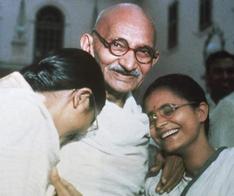
Mahatma Gandhi
You must be the change you wish to see in the
world.—Mahatma Gandhi
First they ignore you; then they laugh at you; then they attack you; then you win.—Mahatma Gandhi
We must always seek to ally ourselves with that part of the enemy that knows what is right.—Mahatma Gandhi
The future depends on what we do in the present.—Mahatma Gandhi
There's enough on this planet for everyone's needs, but not for everyone's greed.—Mahatma Gandhi
First they ignore you; then they laugh at you; then they attack you; then you win.—Mahatma Gandhi
We must always seek to ally ourselves with that part of the enemy that knows what is right.—Mahatma Gandhi
The future depends on what we do in the present.—Mahatma Gandhi
There's enough on this planet for everyone's needs, but not for everyone's greed.—Mahatma Gandhi
An excellent plumber is infinitely more admirable than an incompetent philosopher….the society that scorns excellence in plumbing because plumbing is a humble activity and tolerates shoddiness in philosophy because it is exalted activity….will have neither good plumbing or good philosophy….neither its pipes or its theories will hold water.— John Gardner
To a right-winger, unions are awful. Why do right-wingers hate unions? Because collective bargaining is the power that a worker has against the corporation. Right-wingers hate that.— Janeane Garofalo, 2005
Why should unions support a political party that is in the control of corporate interests that the unions were designed to thwart in the first place? How can the unions get better pay and benefits for its workers when the political party they support is controlled by management?--Timothy V. Gatto, countercurrents.org (October 5, 2010)
Poorly paid labor is inefficient labor, the world over.—Henry George
That alone is wise which is just; that alone is enduring which is right.—Henry George
It is difficult to go on strike if there is no work in the first place.—Lord George-Brown
When people ask me, "Why can't labor organize the way it did in the thirties?' the answer is simple: everything we did then is now illegal.— Thomas Geoghegan
Don't work jobs that you hate to buy things you don't need.—Otis Gibbs (from the song "Jesus On The Couch")
Civil liberties victories never stay won, but must be fought for over and over again.— Ira Glasser
Things that matter most must never be at the mercy of things that matter least.—Goethe
Anything you dream you can do--BEGIN IT. Boldness has genius, power and magic in it.—Goethe
To a right-winger, unions are awful. Why do right-wingers hate unions? Because collective bargaining is the power that a worker has against the corporation. Right-wingers hate that.— Janeane Garofalo, 2005
Why should unions support a political party that is in the control of corporate interests that the unions were designed to thwart in the first place? How can the unions get better pay and benefits for its workers when the political party they support is controlled by management?--Timothy V. Gatto, countercurrents.org (October 5, 2010)
Poorly paid labor is inefficient labor, the world over.—Henry George
That alone is wise which is just; that alone is enduring which is right.—Henry George
It is difficult to go on strike if there is no work in the first place.—Lord George-Brown
When people ask me, "Why can't labor organize the way it did in the thirties?' the answer is simple: everything we did then is now illegal.— Thomas Geoghegan
Don't work jobs that you hate to buy things you don't need.—Otis Gibbs (from the song "Jesus On The Couch")
Civil liberties victories never stay won, but must be fought for over and over again.— Ira Glasser
Things that matter most must never be at the mercy of things that matter least.—Goethe
Anything you dream you can do--BEGIN IT. Boldness has genius, power and magic in it.—Goethe
Arthur Joseph Goldberg (1908-1990)
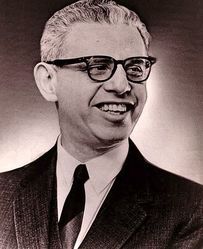
Justice Arthur Joseph Goldberg
“Equal Justice Under The Law.”
That is a great goal. But that goal has not been realized.—Arthur
Joseph Goldberg
The greatest right of a civilized person is to be left alone, unless he does harm to others or is threatening to do harm to himself.—Arthur Joseph Goldberg
We have our principles, but we also must do things that are constantly compromising those principles.—Arthur Joseph Goldberg
You cannot rectify every real or alleged wrong immediately. Time must enter into the picture.—Arthur Joseph Goldberg
It is never easy to define what is moral, particularly in foreign policy. But at the risk of being simplistic, it appears to me that a foreign policy that is morally right protects human rights everywhere.—Arthur Joseph Goldberg
The greatest right of a civilized person is to be left alone, unless he does harm to others or is threatening to do harm to himself.—Arthur Joseph Goldberg
We have our principles, but we also must do things that are constantly compromising those principles.—Arthur Joseph Goldberg
You cannot rectify every real or alleged wrong immediately. Time must enter into the picture.—Arthur Joseph Goldberg
It is never easy to define what is moral, particularly in foreign policy. But at the risk of being simplistic, it appears to me that a foreign policy that is morally right protects human rights everywhere.—Arthur Joseph Goldberg
If you pay peanuts, you get monkeys.—James
Goldsmith
Samuel Gompers (1850-1924)
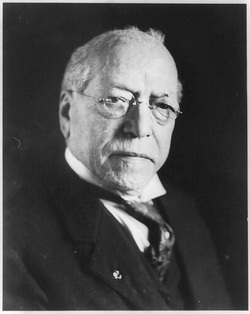
Samuel Gompers
You can't do it unless you organize.—Samuel
Gompers
Do I believe in arbitration? I do. But not in arbitration between the lion and the lamb, in which the lamb is in the morning found inside the lion. I believe in arbitration between two lions or two lambs. When a man puts a pistol to my head and tells me to deliver, there is no arbitration. There can be arbitration only between equals. Let us organize: then we will stand on an equal footing with the employers.—Samuel Gompers
It is impossible for capitalists and laborers to have common interests.—Samuel Gompers
To be free, the workers must have choice. To have choice they must retain in their own hands the right to determine under what conditions they will work.—Samuel Gompers
The man who has his millions will want everything he can lay his hands on and then raise his voice against the poor devil who wants ten cents more a day. . . . We do want more, and when it becomes more, we shall still want more. And we shall never cease to demand more until we have received the results of our labor.—Samuel Gompers
What does labor want? We want more schoolhouses and less jails; more books and less arsenals; more learning and less vice; more leisure and less greed; more justice and less revenge; in fact, more of the opportunities to cultivate our better natures, to make manhood more noble, womanhood more beautiful, and childhood more happy and bright.—Samuel Gompers
No race of barbarians ever existed yet offered up children for money.—Samuel Gompers, on child labor
Our movement is of the working people, for the working people, by the working people. . . . There is not a right too long denied to which we do not aspire in order to achieve; there is not a wrong too long endured that we are not determined to abolish.—Samuel Gompers
Time is the most valuable thing on earth: time to think, time to act, time to extend our fraternal relations, time to become better men, time to become better women, time to become better and more independent citizens.—Samuel Gompers, on the 8 hour work day
Labor Day differs in every essential from other holidays of the year in any country. All other holidays are in a more or less degree connected with conflict and battles of man's prowess over man, of strife and discord for greed and power, of glories achieved by one nation over another. Labor Day is devoted to no man, living or dead, to no sect, race or nation.—Samuel Gompers
Where trade unions are most firmly organized, there are the rights of the people most respected.—Samuel Gompers
Do I believe in arbitration? I do. But not in arbitration between the lion and the lamb, in which the lamb is in the morning found inside the lion. I believe in arbitration between two lions or two lambs. When a man puts a pistol to my head and tells me to deliver, there is no arbitration. There can be arbitration only between equals. Let us organize: then we will stand on an equal footing with the employers.—Samuel Gompers
It is impossible for capitalists and laborers to have common interests.—Samuel Gompers
To be free, the workers must have choice. To have choice they must retain in their own hands the right to determine under what conditions they will work.—Samuel Gompers
The man who has his millions will want everything he can lay his hands on and then raise his voice against the poor devil who wants ten cents more a day. . . . We do want more, and when it becomes more, we shall still want more. And we shall never cease to demand more until we have received the results of our labor.—Samuel Gompers
What does labor want? We want more schoolhouses and less jails; more books and less arsenals; more learning and less vice; more leisure and less greed; more justice and less revenge; in fact, more of the opportunities to cultivate our better natures, to make manhood more noble, womanhood more beautiful, and childhood more happy and bright.—Samuel Gompers
No race of barbarians ever existed yet offered up children for money.—Samuel Gompers, on child labor
Our movement is of the working people, for the working people, by the working people. . . . There is not a right too long denied to which we do not aspire in order to achieve; there is not a wrong too long endured that we are not determined to abolish.—Samuel Gompers
Time is the most valuable thing on earth: time to think, time to act, time to extend our fraternal relations, time to become better men, time to become better women, time to become better and more independent citizens.—Samuel Gompers, on the 8 hour work day
Labor Day differs in every essential from other holidays of the year in any country. All other holidays are in a more or less degree connected with conflict and battles of man's prowess over man, of strife and discord for greed and power, of glories achieved by one nation over another. Labor Day is devoted to no man, living or dead, to no sect, race or nation.—Samuel Gompers
Where trade unions are most firmly organized, there are the rights of the people most respected.—Samuel Gompers
...
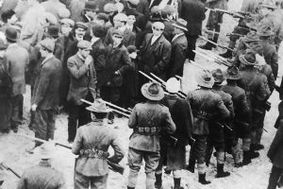
The 'Bread and Roses' strike (1912)
Never forget, people DIED for the eight hour workday.—Rebecca Gordon
The workers of this country do not worry me. I can hire one half of the working class to kill the other half.-- Jay Gould, robber baron
